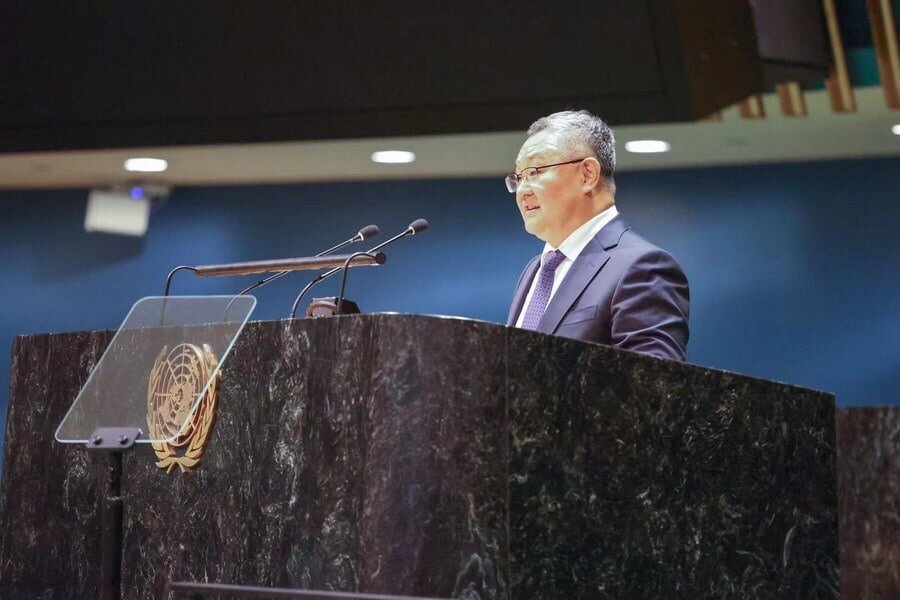China says U.S. should lift sanctions on Iran

TEHRAN- Fu Cong, director-general of the Department of Arms Control of the Chinese Foreign Ministry, has said that the United States should remove all kinds of illegal sanctions it had imposed on Iran.
Addressing the 10th Review Conference of the Parties to the Treaty on the Non-Proliferation of Nuclear Weapons (NPT) on Tuesday, the Chinese official underlined the need for all parties to the 2015 Iran nuclear deal, officially known as the Joint Comprehensive Plan of Action (JCPOA), to remain committed to reviving the deal.
He said all parties concerned should stay committed to bringing the deal back on track at an early date through diplomatic negotiations, and reject the practices of pressure through sanctions and threat of force, according to Xinhua.
“We need to adhere to the direction of political settlement in addressing the challenges of nuclear-proliferation. All parties concerned should stay committed to bringing the JCPOA back on track at an early date through diplomatic negotiations, and reject the practices of pressuring with sanctions and threat of force. The U.S. should completely lift its relevant illegal sanctions on Iran and long-arm jurisdiction measures on third parties. On that basis, Iran should return to full compliance with its nuclear commitments,” Cong said.
China has voiced support for building a consensus in the stalled nuclear talks over the JCPOA. Chinese Foreign Ministry spokesperson Zhao Lijian said on Monday, “The negotiations on resuming compliance with the JCPOA are now at a critical juncture. Parties concerned should stay committed to the direction of dialogue and negotiation and step up diplomatic efforts to strive for consensus on outstanding issues.”
He added, “The U.S., as the one who started the Iranian nuclear crisis, should fully rectify its erroneous policy of ‘maximum pressure’ and respond positively to Iran’s legitimate and reasonable demands, which will help to enable the negotiations to produce results at an early date.”
The nuclear talks have come to a halt after disagreement over who should make a political decision to conclude them. Iran says the U.S. has refrained from making such a decision. The U.S. has recently imposed new sanctions against Iran allegedly targeting foreign firms facilitating Iranian oil sales.
Iranian Foreign Minister Hossein Amir Abdollahian announced on Monday that Iran was ready for making a deal. “I want to reiterate once again that we are serious about reaching a good, strong, and lasting deal. If the American side behaves realistically and shows the necessary flexibility in the possible negotiations, reaching a deal will not be out of reach,” he said, according to Fars News.
And Iran’s chief negotiator, Ali Bagheri Kani, has said Iran is ready to conclude the talks in a short period of time if the U.S. is ready to reciprocate.
Amir Abdollahian said the U.S. can’t get concessions at the negotiating table by imposing sanctions.
“The Americans should not think that they can get concessions at the negotiating table with these measures. They should abandon their excessive demands and if they continue to pursue such demands, we will never sit idly by,” he said.
Amir Abdollahian said Iran responded to the new sanctions by injecting uranium gas into hundreds of advanced centrifuges. “We are witnessing the madness of imposing sanctions, which of course is just a show and has no tangible impact on the ground. In response to this American action, we inject gas into hundreds of new generation centrifuges,” he said.
Iran started injecting hexafluoride gas into 500 new advanced IR-6 centrifuges on Monday.
Behrouz Kamalvandi, the spokesman for the Atomic Energy Organization of Iran (AEOI), said this is in line with the plan to make 190,000 SWUs (separative work units) operational in the nuclear industry.
Talking to the national TV late on Monday, Kamalvandi said the order to install new centrifuges was issued on Monday.
The nuclear spokesman said Iran has informed the International Atomic Energy Agency (IAEA) of its decision.
Leave a Comment